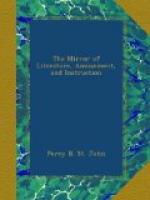Though dull the joke, ’tis wise
to laugh,
Parch’d be the tongue that cannot
quaff
Save from a golden chalice;
Let jesters seek no other plea,
Than that their merriment be free
From bitterness and malice.
Silence at once the ribald clown.
And check with an indignant frown
The scurrilous backbiter;
But speed good-humour as it runs,
Be even tolerant of puns,
And every mirth-exciter.
The wag who even fails may claim
Indulgence for his cheerful aim;
We should applaud, not hiss
him;
This is a pardon which we grant,
(The Latin gives the rhime I want,)
“Et petimus vicissim.”
Ibid.
* * * * *
Your love is like the gnats, John,
That hum at close of day:
That sting, and leave a scar behind,
Then sing and fly away.
Weekly Review.
* * * * *
VILLANOVA MILL.
[Illustration]
The Portuguese mills have a very extraordinary appearance, owing chiefly to the shape of their arms or sails, the construction of which differs from that of all other mills in Europe.
Villanova de Milfontes is a little town, situated at the mouth of a little river which flows from the Sierra de Monchique. Formerly there was a port here, formed by a little bay, and defended by a castle, which might have been of some importance at a period when the Moors made such frequent incursions upon the coasts of the kingdom of the Algarves; at present a dangerous bar and banks of quicksands hinder any vessels larger than small fishing-boats from entering the port.
Fig trees from 20 to 30 feet high overshadow the moat of the castle, and aloes plants as luxuriant as those of Andalusia, shoot up their stems crowned with flowers along the shores of the bay, and by the sides of the roads, whose windings are lost amongst the gardens that surround Milfontes.
* * * * *
We have seen Mr. HAYDON’S PICTURE of the Chairing of the Members; but must defer our description till the next number of the MIRROR. In the meantime we recommend our readers to visit the exhibition, so that they may compare notes with us. “The Chairing” is even superior to the “Election.”
* * * * *
NOTES OF A READER.
* * * * *
STORY OF RIENZI.
(The original of Miss Mitford’s New Tragedy.)




